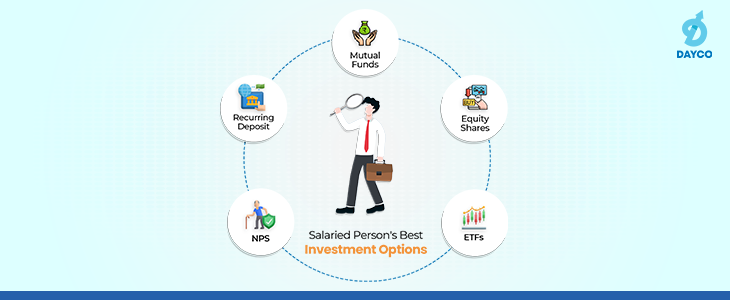Are you looking to secure your financial future and achieve your long-term goals? Saving money every month is a wise financial practice that can pave the way for a prosperous future. Whether you’re planning for retirement, an emergency fund, your child’s education, or any other financial milestone, knowing the means to save money effectively is crucial. If you are a salaried person – enjoying stable cash flow every month, you must invest a portion of that amount. But where should you invest? In this blog post, we’ll explore 6 effective investment options for a salaried person in India.
Mutual Funds
Mutual Fund SIP is ubiquitous and for all good reasons. It is particularly useful for people who have a day job. They don’t get time to examine stocks or dig deeper into the financials of individual companies. This is why Mutual Funds is one of the comfortable investment options for a salaried person. You invest in a mutual fund, sit back and let the fund manager manage the fund. Or, better even – you invest in an index fund, and let your fund grow passively.
Almost all funds offer SIP options for investing in multiple categories. These categories are broadly classified as either equity funds, debt funds, or hybrid funds. Mutual funds have a fund for every one of your goals, be it retirement, vacation, child education, or anything else. It’s a vast universe with many options. Moreover, the SIP route of investing provides flexibility, allowing you to start with a small amount while benefiting from professional fund management. This approach helps you diversify your investments and build wealth over time.
Equity Shares
Direct equity investing presents an enticing opportunity for those looking to save and grow their wealth over time. A well-crafted investing system, thorough research, risk management, patience, long-term perspective, and discipline have the potential to build great wealth through equities. You can invest in direct equity by opening a trading and a Demat account with a registered broker. While equities can deliver significant gains, you must know they come with the risk of market volatility, company-specific issues, and the importance of emotional discipline. It is best to avoid direct equity if you are new to the equity market and have yet to hire a SEBI-registered advisor. Investing in individual stocks can also be done through the SIP route at regular intervals.
Exchange-traded funds (ETFs)
Exchange-traded funds (ETFs) are investment funds that are similar to mutual funds but are traded on stock exchanges, representing a basket of assets like stocks or bonds. You can invest in ETFs with a systematic approach, similar to mutual fund SIPs. ETFs are economical products known for their diversification and passive nature. You will find many ETFs following common Indian indices like NIFTY50 and SENSEX listed on NSE and BSE. Since ETFs act like mutual funds, they are also a good investment option for salaried people who don’t get time to perform research on individual stocks.
National Pension System (NPS): A Good Investment Option For Salaried People Looking To Secure Their Future
The National Pension System (NPS) is a government-sponsored retirement system that allows individuals to invest in a mix of equity, debt, and alternative instruments. It is an excellent way to build a financial safety net for your golden years. NPS can also be used for other savings goals with its flexible Tier II option. NPS Tier I investments also offer exclusive tax benefits like a deduction on the employer’s contribution (80CCD2) and an additional 50K tax deduction under the old regime (80CCD1B). A salaried person would want his or her future to be secure after retirement. For this purpose, NPS can be a good investment instrument for salaried individuals in India.
Recurring Deposit
Recurring Deposit (RD) is a fixed-income instrument where you deposit a fixed amount each month for a predetermined tenure. It offers a safe way to save money and earn interest, with the principal amount returned at maturity along with interest. RDs are low-risk and ideal for those looking for a predictable savings option. RDs are widely available with banks and post offices.
Public Provident Fund (PPF)
The Public Provident Fund (PPF) is a long-term savings scheme offered by the Government. With PPF, you can contribute a fixed amount each month and benefit from tax exemptions while enjoying guaranteed tax-free returns. It’s a reliable option for building wealth while taking advantage of tax benefits. The contribution is capped at 1.5 lakhs per annum and has an initial maturity of 15 years. PPF can be a good investment option for those risk-averse salaried persons.
Final Words
Remember that it is crucial to align your savings strategy with your financial goals and risk tolerance. Every instrument listed above may not be suitable for you. You have to choose the method that aligns best with your financial goals and risk tolerance. To save money every month effectively, consider setting up automated transfers from your bank account to your chosen savings instruments on your payday. This ensures consistency and eliminates the temptation to spend the money instead. Remember that saving money requires discipline and a long-term perspective. Whether you opt for the National Pension System, Recurring Deposits, Mutual Fund SIPs, Equity Shares, Exchange-Traded Funds, or the Public Provident Fund, the key is consistency and discipline.
If you have a question, share it in the comments below or DM us or call us – +91 9051052222. We’ll be happy to answer it.
~ Nischay Avichal
















